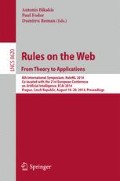Abstract
Typical reactive system languages are programmed by means of rules of the form if antecedent then consequent. However, despite their seemingly logical character, hardly any reactive system languages give such rules a logical interpretation. In this paper, we investigate a simplified reactive system language KELPS, in which rules are universally quantified material implications, and computation attempts to generate a model that makes the rules true.
The operational semantics of KELPS is similar to that of other reactive system languages, and is similarly incomplete. It cannot make a rule true by making its antecedent false, or by making its consequent true whether or not its antecedent becomes true. In this paper, we characterize the reactive models computed by the operational semantics. Informally speaking, a model is reactive if every action in the model is an instance of an action in the consequent of a rule whose earlier conditions are true.
Access this chapter
Tax calculation will be finalised at checkout
Purchases are for personal use only
Preview
Unable to display preview. Download preview PDF.
References
Barringer, H., Fisher, M., Gabbay, D., Owens, R., Reynolds, M.: The imperative future: Principles of executable temporal logic. John Wiley & Sons, Inc. (1996)
Bonner, A., Kifer, M.: Transaction logic programming. In: Warren, D.S. (ed.) Logic Programming: Proc. of the 10th International Conf., pp. 257–279 (1993)
Eshghi, K.: Abductive Planning with Event Calculus. In: ICLP/SLP, pp. 562–579 (1988)
Gurevich, Y.: Evolving algebras 1993: Lipari guide. In: Specification and validation Methods, pp. 9–36 (1995)
Harel, D.: Statecharts: A Visual Formalism for Complex Systems. Sci. Comput. Programming 8, 231–274 (1987)
Jaffar, J., Lassez, J.L.: Constraint logic programming. In: Proceedings of the 14th ACM SIGACT-SIGPLAN Symposium on Principles of programming languages, pp. 111–119. ACM (1987)
Kakas, A.C., Kowalski, R., Toni, F.: The Role of Logic Programming in Abduction. In: Handbook of Logic in Artificial Intelligence and Programming, vol. 5, pp. 235–324. Oxford Univerpsity Press (1998)
Kakas, A.C., Mancarella, P., Sadri, F., Stathis, K., Toni, F.: The KGP model of agency. In: Proc. ECAI 2004 (2004)
Kowalski, R., Sadri, F.: From Logic Programming Towards Multi-agent Systems. Annals of Mathematics and Artificial Intelligence 25, 391–419 (1999)
Kowalski, R., Sadri, F.: Integrating Logic Programming and Production Systems in Abductive Logic Programming Agents. In: Polleres, A., Swift, T. (eds.) RR 2009. LNCS, vol. 5837, pp. 1–23. Springer, Heidelberg (2009)
Kowalski, R., Sadri, F.: An Agent Language with Destructive Assignment and Model-Theoretic Semantics. In: Dix, J., Leite, J., Governatori, G., Jamroga, W. (eds.) CLIMA XI. LNCS (LNAI), vol. 6245, pp. 200–218. Springer, Heidelberg (2010)
Kowalski, R., Sadri, F.: Abductive Logic Programming Agents with Destructive Databases. Annals of Mathematics and Artificial Intelligence 62(1), 129–158 (2011)
Kowalski, R., Sadri, F.: A Logic-Based Framework for Reactive Systems. In: Bikakis, A., Giurca, A. (eds.) RuleML 2012. LNCS, vol. 7438, pp. 1–15. Springer, Heidelberg (2012)
Kowalski, R., Sadri, F.: Model-theoretic and operational semantics for Reactive Computing. To Appear in New Generation Computing (2014)
Kowalski, R., Sergot, M.: A Logic-based Calculus of Events. New Generation Computing 4(1), 67–95 (1986)
Paschke, A., Boley, H., Zhao, Z., Teymourian, K., Athan, T.: Reaction RuleML 1.0: standardized semantic reaction rules. In: Bikakis, A., Giurca, A. (eds.) RuleML 2012. LNCS, vol. 7438, pp. 100–119. Springer, Heidelberg (2012)
Shanahan, M.: Solving the frame problem: A mathematical investigation of the common sense law of inertia. MIT press (1997)
Shanahan, M.: An abductive event calculus planner. The Journal of Logic Programming 44(1), 207–240 (2000)
Fikes, R.E., Nilsson, N.J.: STRIPS: A new approach to the application of theorem proving to problem solving. Artificial Intelligence 2(3), 189–208 (1972)
Author information
Authors and Affiliations
Editor information
Editors and Affiliations
Rights and permissions
Copyright information
© 2014 Springer International Publishing Switzerland
About this paper
Cite this paper
Kowalski, R., Sadri, F. (2014). A Logical Characterization of a Reactive System Language. In: Bikakis, A., Fodor, P., Roman, D. (eds) Rules on the Web. From Theory to Applications. RuleML 2014. Lecture Notes in Computer Science, vol 8620. Springer, Cham. https://doi.org/10.1007/978-3-319-09870-8_2
Download citation
DOI: https://doi.org/10.1007/978-3-319-09870-8_2
Publisher Name: Springer, Cham
Print ISBN: 978-3-319-09869-2
Online ISBN: 978-3-319-09870-8
eBook Packages: Computer ScienceComputer Science (R0)

